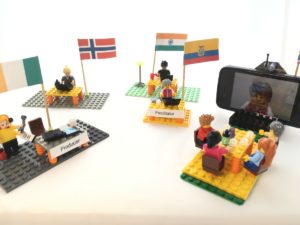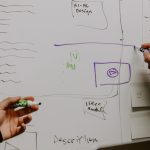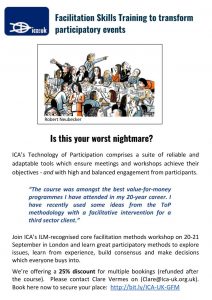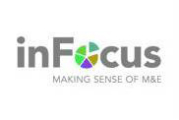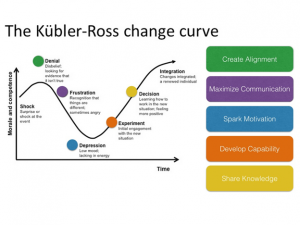Orla Cronin Research Blog
Feb
The joy of hybrid
We had an exciting week of it, delivering an in house version of our Designing and Facilitating Hybrid events course. Up to 45 minutes before we were due to merge our Roomies and Zoomies into one beautiful whole, the Roomies were detained outside their building by a security crisis. Our ‘backchannel’ worked beautifully, and our resourceful Room Liaison managed to have everyone marshalled inside in time to start.
Later in the week, a conference room tech configuration refused to work. In a matter of moments, we pivoted the Roomies to a different configuration, gave them camera and workspace access via Zoom, while they moved rooms and then used a single computer mic and speaker for speech.
Such wonderful examples to add to the wealth of case studies we’ve developed – the first of these illustrates the importance of well briefed and dedicated Liaison, and the second illustrates how important it is to be able to rapidly think through and reconfigure mic, speakers, cameras and workpaces.
We’ll share all these insights, and many more, on our next Designing and Delivering Hybrid Events public course – there are a few seats left and we start on 28th February! Booking here: ICA:UK.
We’ are: myself, Kim Roth Howe, Una McAlinden, Oscar Wouters Duran.
Feb
Design principles for humane hybrid events
Hybrid gatherings have been happening for years, from the team meeting where we arrive and hear that ‘Mary is going to dial in’, to a company wide ‘all hands’ meeting where national teams convene in conference rooms around the globe. Many organisations are starting to plan for hybrid gatherings in anticipation of at least partial lifting of lockdown.
Many facilitators, myself included, when approached to design a hybrid event, start with ‘are you *really* sure you want one?’! A hybrid event is effectively three events comprising: the people co-located in a physical space (the ‘Roomies’), the people who are joining by phone or virtual meeting platform (the Zoomies), and the meeting where you are trying to link all of these participants together: the Full Catastrophe, as Zorba the Greek might call it.
I have spent lots of time trying to map the variations of hybrid meetings using pods and nodes and network diagrams, but I realised that was a little like planning to bake a cake and only thinking about the receptacle – round tin or square tin or muffin tins or even paper bun cases – rather than focusing on whether I wanted a lemon drizzle cake, or banana bread or [insert your favourite lockdown treat here!]. I want my cake to be tasty and perhaps even a bit healthy, and I’ll probably manage to make it roughly the right flavour and texture, regardless of the kind of tin I use. Similarly, I want to help people achieve their aims for an event, regardless of the technical configuration of wires and pods and nodes. ‘Hybridity’ is the means rather than the end. We don’t set out to have a ‘hybrid’ meeting, we set out to bring people together to achieve something.
So, let’s leave aside the different containers and configurations and logistics to focus on what’s really important. There are two crucial elements particular to hybrid gatherings which, if we get them right, will help people do the work they have convened to do, and help them to actually thrive doing it. I’ve called these two elements ‘coherence’ and ‘connection’.
‘Coherence’ is the extent to which everyone can contribute to and receive all parts of the event. This particularly refers to having access to other participants’ (verbal or written) contributions (as distinct from just the input of keynote speakers or panels). Literally and metaphorically, it means everyone being ‘on the same page’, even as that page fills up with questions, ideas, insights and other contributions from participants. It enables people to feel heard, whether that is in writing, or verbally.
Coherence is an aspect of events that we can take for granted when we are all co-located in either virtual or physical space but it requires really careful design when people are working in different spaces. Different media and tools become vital, for example flip charts, ‘stickies’, virtual whiteboards, or shared electronic documents.
As a simple example, in a workshop with GlobaltFokus, where the trainer and producer were remote and the participants were co-located, participants photographed the flip charts they generated in their small group work and uploaded them to the (virtual) meeting platform we were using. This enabled the trainer and all the other participants to see each group’s material projected on a screen, and discuss them during plenary.
Connection is the extent to which everyone in the room has an opportunity for some meaningful human interaction. That can be obtained from interacting with others in general, but it becomes a more compelling and richer experience when it occurs with a more intimate pair or small group (up to 5). This kind of connection often starts to happen naturally at face to face events, over coffee, while we’re waiting to start, and during breaks. We’re all getting much better at building it into virtual events, using a range of tasks and tools to enable people to have conversations in smaller groups, with breakouts being the best example. But once we move into hybrid events, it is all too easy, particularly in relation to social time, to let the ‘Roomies’ do their own social thing, and leave the remote ‘Zoomies’ to step away by themselves. This has the effect of creating two diverging meetings – the virtual one and the face to face one, and it particularly disadvantages the remote participants. Of course, remote participants may be able to get light relief, stimulation and empathy from others in their immediate location (though not even that at the moment, where so many of us are working in solitary home offices), but putting real thought and effort into helping everyone build some familiarity, empathy and understanding with at least some other participants will help to increase engagement at the event and commitment to the outcomes, and will create an experience of inclusion, of really mattering. All of these make it easier to keep people present and involved, to identify and address dissent and resolve conflict, to sow the seeds for consensus, and crucially, to support participants towards collective action.
In an event we facilitated recently, with 11 co-located participants and two remote participants, we used a separate, lighthearted messaging channel where photographs and snippets were shared among all event participants, whether co-located or remote. This simple addition helped to give the Zoomies a sense of being remembered and included, and helped to remind the Roomies that there were important voices outside the main room.
There’s plenty more to talk about in relation to how to do all of this, and I’ll save that for my next post, but let’s cut to the chase cake: participatory, engaging and productive hybrid events can be delivered by using the concepts of coherence and connection to design a unified – and unifying – event for all participants.
Tagged | collaboration, facilitation, hybrid, leadership, meetings, participation, remote teams, teamwork, virtual facilitation, virtual meetings, virtual workshops
Jul
Virtual facilitation training
Now taking bookings for the next round of our Facilitating Great Virtual Events course. Starting 15th September, and already filling up! https://www.ica-uk.org.uk/course/facilitating-virtual-events-i-online-i-sept/
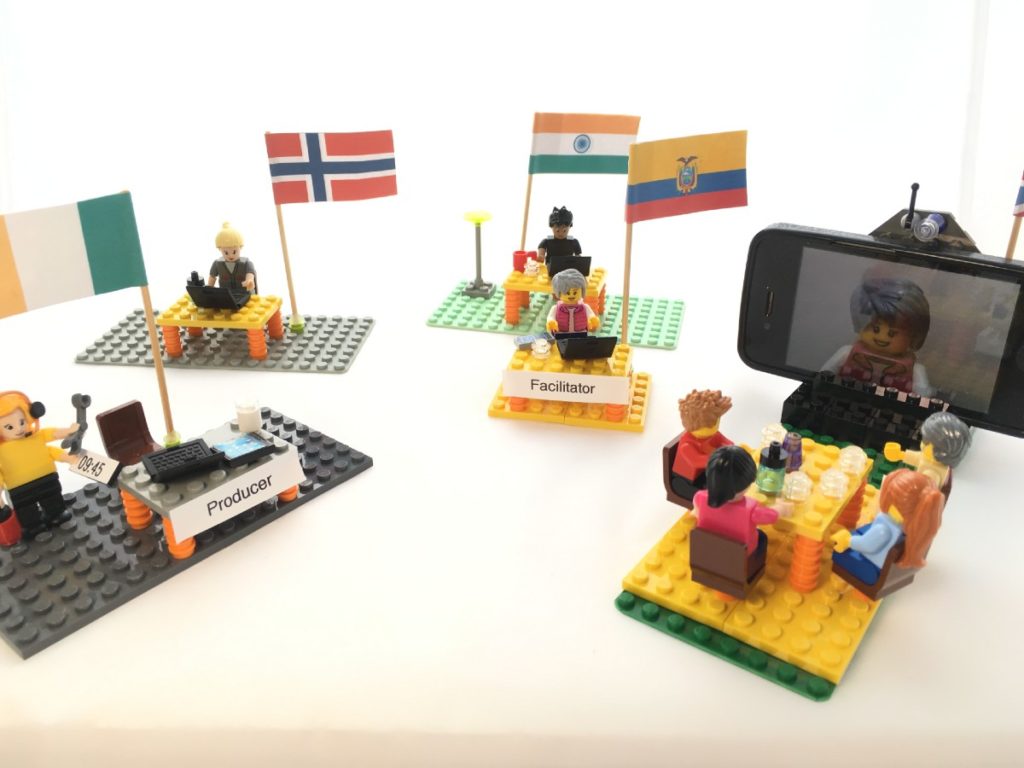
Tagged | facilitation, virtual facilitation, virtual workshop; facilitation;
May
Virtual facilitation – podcast
IAF England and Wales have started up a podcast on matters facilitative. I have the honour of appearing briefly on the third episode, talking about my journey in virtual facilitation https://www.listennotes.com/podcasts/facilitation-stories/fs17-how-facilitators-are-McbSB9T_5zA/
Tagged | facilitation, virtual facilitation
Apr
Qualitative data analysis micro course in Arabic
Last year, I was commissioned, via Intrac, to design a micro (10 minute) qualitative data analysis course for Disasterready.org (providing free online courses for humanitarian and international development professionals). 126 satisfied reviews so far! The Arabic translation has just launched: this gives me the incentive to dust off my أَلْأَبْجَدِيَّة ٱلْعَرَبِيَّة and have a go at deciphering my own words!
Tagged | qualitative data analysis
Apr
Virtual facilitation training
While we are getting our intensive course up and running, we’re offering a 90 minute introduction to virtual facilitation. It’s selling out fast!

Apr
Tips on virtual facilitation

I’ve been working in virtual facilitation for almost a decade, but current circumstances have pushed me to share some material from my short and long virtual facilitation training courses. I’ve shared some tips in some guest blog for ICA:UK – see the first one here. Thanks to bruce@legophotofy.com for the images.
Feb
Online training in Monitoring, Evaluation and Learning
Applications are now open for INTRAC‘s next Online Monitoring, Evaluation and Learning course. This distinctive course, which always gets positive feedback from participants, involves one to one mentoring, individual feedback on assignments, and a curated discussion forum, as well as engaging and highly participatory real time online sessions. Alison Carney and myself, the trainers, always enjoy this animated and highly personalised course.
Jan
Training in virtual facilitation
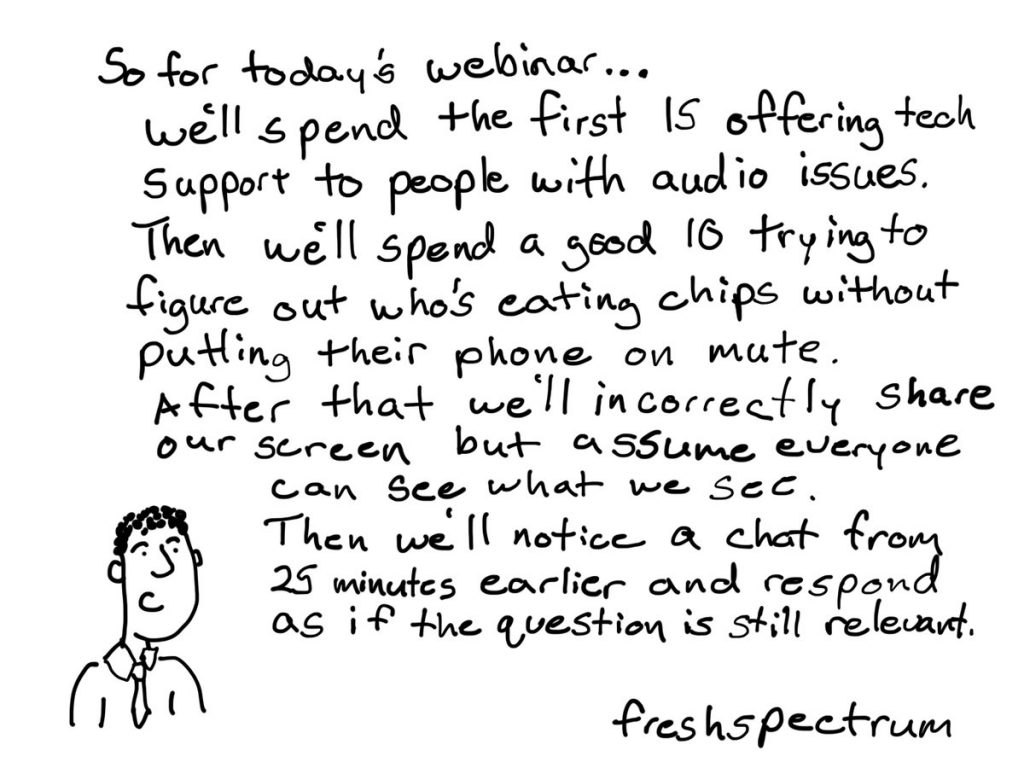
Avoid this, by learning how to design and facilitate engaging, inclusive and productive online workshops. The long standing online training in virtual facilitation, on which Orla has been collaborating for the past 5 years, starts again on 16th January, and there is *one* seat left. The course runs remotely, on 8 consecutive Thursdays, at 15:00 UTC/GMT. Bespoke/in house training on your preferred conferencing platform is also available: contact orla@orlacronin.com With thanks to Chris Lysy for the cartoon.
Tagged | training, virtual facilitation, virtual workshop; facilitation;
Oct
Group Facilitation Training, Manchester
Do you want to help groups to have constructive conversations? Would you like meetings to be more participatory, collaborative and creative? How can we ensure that groups define and meet their objectives, with no-one left behind? Come to the Group Facilitation Methods course (4th-5th December 2019) in Manchester. Suitable for both novice and experienced facilitators. Trainer: Orla Cronin. Booking link here
Tagged | consensus, facilitation
Sep
Group facilitation methods training, Dublin
My colleague Miriam O’Donoghue and I are running a Group Facilitation Methods course with ICA:UK in Dublin on 1st-2nd October – some places still available. The details are here: https://www.ica-uk.org.uk/index.php?option=com_civicrm&task=civicrm/event/info&reset=1&id=207
Jul
Virtual facilitation training
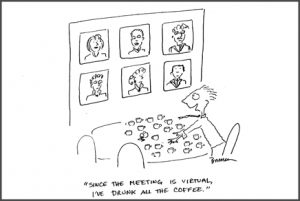
Internationally, across the public, private and voluntary sector, we spend up to 17 hours a week in meetings.
32% of all meetings are virtual (38% for employees under 35 years old)
67% of employees report that more than half the meetings they attend are not of value!
Yet what proportion of our training and facilitation budgets do we invest in making virtual meetings more engaging and productive?
Why not start with training virtual facilitators?
ICA:UK’s virtual facilitation training starts on 28th September 2017 and runs for 8 weeks. You will learn virtual facilitation skills that apply across platforms e.g. Zoom, Gotomeeting, Skype
- Learn to lead engaging online meetings that elicit innovative thinking and creative problem-solving.
- Gain competency leading virtual meetings with Adobe Connect, and ToP Focused Conversation.
- Build your confidence as a virtual facilitator.
- Learn tools and techniques for eliciting participation, virtual meeting design, and five best practices.
Learning Objectives
To develop basic skills essential to virtual facilitation, including how to use tested and proven collaboration tools:
- Adobe Connect — a flexible virtual collaboration platform where participants can build engaging meetings through the use of electronic sticky walls, virtual breakout rooms, and a variety of pods that elicit participation.
- Basecamp — a lightweight, web-based collaboration and productivity platform. Members can post messages, share links, share any kind of file, add events to a calendar, and assign tasks.
Who should attend this course?
This course is intended for anyone who is leading virtual meetings, virtual training, or webinars in the private, public or voluntary sector including Project Managers, Team Leaders, Facilitators, Trainers, Coaches, and Community Activists
Training approach
Participants experience practical, hands-on learning:
PRACTICE. Integrate learning by designing a virtual Focused Conversation with a partner, and by practising as facilitators and producers, with the rest of the class acting as participants.
COACHING. Receive one hour of one-on-one coaching from a trainer. Use the hour any way you like — to cover a topic you missed, polish a skill, or to go deeper.
FEEDBACK. Receive peer and trainer feedback during practice sessions.
CLASSROOM. Eight virtual sessions using Adobe Connect.
ASSIGNMENTS. One to two hours of assignments between sessions deepens the learning, and includes practice with a partner.
RESOURCES. Collaborate with classmates in Basecamp (no subscription needed).
Book here or contact orla@orlacronin.com for more information
Tagged | training; facilitation; workshops
Jun
Online training
I am embroiled in preparing for 2 online courses at the moment. One is the Intrac Online M&E course – we have 17 participants spanning 4 continents. We’re using Moodle as the asynchronous course platform, for discussions, homework and resources, and Blackboard Collaborate as the synchronous workshop/seminar platform.
I’m also starting to train today on an in-house Virtual Facilitation Online course with the Center for Disease control in the US, alongside with my ICA:USA colleagues Ester Mae Cox, Nileen Verbeten, Brenda Schmidt and Sheila Cooke. For this, we’re using Wiggio for the asynchronous component, and Adobe Connect for the workshops.
This is giving me a great opportunity to compare and contrast different platforms. Part of course design, in addition to creating content, is designing for learning and fostering peer interaction: this is often sacrificed in online training, but in fact, it becomes even more important to design, as it doesn’t necessarily happen naturally when people aren’t milling around drinking coffee together and chatting when they sit beside each other.
Within our training, we’re pushing ourselves to continuously model best practice in online facilitation…. to avoid webinar-induced comas!
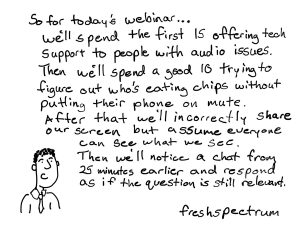
Tagged | facilitation, M&E, training, virtual facilitation
May
Intrac Online M&E course
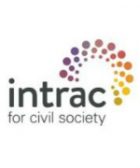
Orla is delighted to have become an INTRAC associate. She is lead trainer on the forthcoming online M&E course. This marries her skills in monitoring and evaluation, and online facilitation, beautifully, and she’s really looking forward to the next course, which starts on June 12th.
This 4 week (part time) course is aimed at participants who are relatively new to M&E. It aims to develop an understanding of the principles and practice of effective M&E, share examples of M&E approaches and tools appropriate to different types of interventions and contexts, and will help participants to tackle their own M&E challenges. Click here for a more detailed description.
The ‘synchronous’ (real time) meetings will run on Blackboard Ultra, and the asynchronous learning forum takes place on Moodle.
Click here to register for this course
Apr
Intrac Online M&E Course
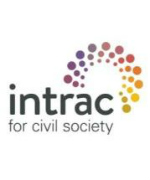
Orla is delighted to be training one the forthcoming Intrac Online M&E Course, which is now open for registration. Further information available here.
Mar
Learning co-ordinator “I define me”
I’m really pleased to be collaborating with the Cape Town based consultancy Southern Hemisphere to provide learning support to projects in South Africa, Columbia and the UK, focused on empowering young women to move away from gangs. One of the projects I’m supporting is even on my doorstep: cycling rather than flying to meet clients is a rare treat!
https://www.mmu.ac.uk/news/news-items/5315/
Dec
Free Theory of Change webinar
Date: Thursday, December 15th, 2016
Time: 9am CST / 10am EST / 3pm GMT / 4pm CET
Duration: 1 Hour
Dear webinar registrant,
Thanks for registering for Wednesdays How to create a powerful and ‘best in class’ Theory of Change webinar.
In this webinar you will learn:
- What makes a powerful and compelling Theory of Change
- Top tips on how to create a Theory of Change, including free tools and resources to take away
- How learning communities can help you to develop a ‘best in class’ Theory of Change
The webinar will also create the opportunity to connect with other similar organisations that have developed or are in the process of developing, their Theories of Change.
The event joining details follow below:
Event number: 849 183 611
Event password: TOC1
——————————————————-
To join the online event
——————————————————-
- Click here to join the online event.
Or copy and paste the following link to a browser:
https://impactinfocus.webex.com/impactinfocus/onstage/g.php?MTID=eb64ad51430370a4378eefb3adb7c3e3c
- Click “Join Now”.
——————————————————-
To join the audio conference only
——————————————————-
Call-in toll number (UK): +44-203-478-5289
Global call-in numbers: https://impactinfocus.webex.com/impactinfocus/globalcallin.php?serviceType=EC&ED=452714802&tollFree=0
Access code: 849 183 611
——————————————————-
For assistance
——————————————————-
You can contact your inFocus Host at:
tom@impactinfocus.com
Can’t join the event?
The playback of UCF (Universal Communications Format) rich media files requires appropriate players. To view this type of rich media files in the meeting, please check whether you have the players installed on your computer by going to https://impactinfocus.webex.com/impactinfocus/onstage/systemdiagnosis.php
We look forward to seeing you.
Laura Goldsmith
The Marketing Team
www.impactinfocus.com
Tagged | theory of change
Nov
There are still spaces available on ICA:UK’s Group Facilitation Methods training in Manchester on 17th -18th November, with Orla as the trainer. Booking link here
Tagged | training; facilitation; workshops
Jul
10 post-referendum coping strategies
By coincidence, a couple of weeks ago, I was researching the concept of “othering” – “to view or treat (a person or group of people) as intrinsically different from and alien to oneself”. The evolution of this concept can be traced through a number of philosophers, sociologists and pyschologists, from Hegel, through De Beauvoir, and on through Lacan, Levi-Strauss, Said, Rorty….and a search for “referendum” and “othering” shows a surge in its use. I had only been delving into the term as part of my reaction to a film, and it’s dismaying that it has become so acutely relevant so suddenly: I’ve found myself using it several times a day during the past week.
My Framework colleague Gopal shared some thoughts with us on his reactionto B***xit and this catalysed some of my own thinking on how to move beyond “othering” and create some sort of functioning vision for the future. Many models of change and shock (e.g. the Kubler Ross change model – thanks, Gopal), and Otto Sharmer’s Theory U emphasise the importance of taking time to reflect and conduct ‘deep listening’, and then moving on to experimentation.
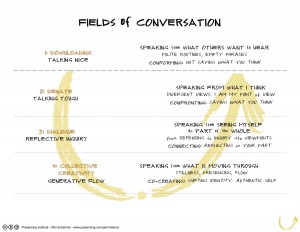 It’s been interesting to notice, among all the noise, some really tangible initiatives around – ideas, experimentation, prototyping and implementation, all with the goal of building community cohesion and resilience, and ensuring that voices are heard from all parts of society. Some of these are a resurgence of interest in tools and techniques which have existed for many years; others are very new. The themes which seem to be emerging are, firstly, how to have meaningful conversations characterised by empathic listening across a gulf such as the one which has opened between ‘Remain’ and ‘Leave’ and secondly, how to turn those conversations into a form of democracy, widening the term beyond ‘representational democracy’, to participative and deliberative democracy? Here are a few initiatives which caught my eye:
It’s been interesting to notice, among all the noise, some really tangible initiatives around – ideas, experimentation, prototyping and implementation, all with the goal of building community cohesion and resilience, and ensuring that voices are heard from all parts of society. Some of these are a resurgence of interest in tools and techniques which have existed for many years; others are very new. The themes which seem to be emerging are, firstly, how to have meaningful conversations characterised by empathic listening across a gulf such as the one which has opened between ‘Remain’ and ‘Leave’ and secondly, how to turn those conversations into a form of democracy, widening the term beyond ‘representational democracy’, to participative and deliberative democracy? Here are a few initiatives which caught my eye:
1. The Kumi method for conflict transformation, in which some of my ICA:UK colleagues collaborated
2. Compassionate Listening engages participants in processes that “have each side seeing the humanity of the other, even when they disagree”. This approach was developed for peacebuilding in areas of acute conflict, but it now feels very relevant closer to ‘home’ (whatever ‘home’ means these days)
3. I hadn’t heard of Neighbourhood Plans before now, but they have statutory status, are developed by a group of citizens, and are concerned with local issues such as housing, transport, amenities. They have to be considered by the local authority (the legislation was introduced in 2011) and so they are a forum which goes beyond passive ‘consultation’ to more active co-creation. Some low tech tools for planning are available here
4. In Spain, Podemos have been particularly active in involving citizens in the development and running of their movement, using both face to face and online collaboration tools. The latter include using Agora Voting to shortlist their MEP candidates and using Appgree and Loomio for idea testing and decision making (Podemos have also been involved in piloting D-Cent, below)
5. The RSA launch the Citizens Economic Council next week. This is a project examining the connection between lay economic thinking and economic policy by enabling citizens to deliberate and make recommendations on future economic priorities.
6. So say Scotland is an online hub for innovation around democracy in Scotland. They use story telling, game playing, and citizens assemblies to “broaden participative and deliberative democracy as a compliment to and an evolution of representative democracy”, inspired by Iceland’s ‘Anthill’ assembly in 2009. It seems to have gone little quiet at the moment on the web, though the Facebook page is active
7. Nesta have funded D-CENT (Decentralised Citizens Engagement Technologies), which is a platform and a set of tools to enable citizen engagement. Pilots will run with existing user communities to gather knowledge and test the platform, but the system is open to movements anywhere starting to test and use the software. It is being piloted in Spain, Iceland, and Finland by organisations such as the 15M citizen movement, Citizens Foundation, Better Reykjavik and Better Iceland, and Open Ministry, a crowdsourcing site linked to the Finnish parliament. Whoops, this is a European project – what will happen to projects like these now?
8. Crowdpac, in addition to providing very detailed ‘ideological mapping’ of political candidates to make it easier to decide how to vote, also provides ‘micro delibration’ for the individual to help them work out where they actually stand, before casting their vote. This helps us to move beyond personality politics and make more informed decisions (the intention is that Crowdpac will also work to create more diversity among candidates for political office by facilitating crowdfunding for campaigns).
9. Participatory budgeting is gaining traction. Scotland’s ahead of the game here too (this post was *not* written by our Scottish Frameworker, honest!). The aim of participatory budgeting is to “address inequalities in service provision and resource allocation, engage and empower citizens in discussions on public budgets and stimulate co-production and mutual responsibility between citizens and the state”.
9.5 I confess I was stuck for #10 so I turned to one of my favourite blogs, From Poverty to Power, to see whether there might be a glimmer of light. There I found an interesting analysis of the implications of the referendum for development and aid, and a wonderful neologism, “straw clutchism”, which may be what I’m doing!
10. And then, just as I was going to post with 9½ thoughts, I received a message via one of my ICA:UK colleagues. Involve, the thinktank and charity specialising in public participation with a mission to “deepen democracy”, have issued a shout out for facilitators to “explore the different ways that we might work together to make the post-referendum debate more productive; and to provide a space for people with facilitation and engagement skills to learn more about each other and spark productive partnerships”. The mooted date for a first meeting is 22nd July.
Maybe something can be built from the ashes?
Tagged | consultation, deliberative, participation, participatory
